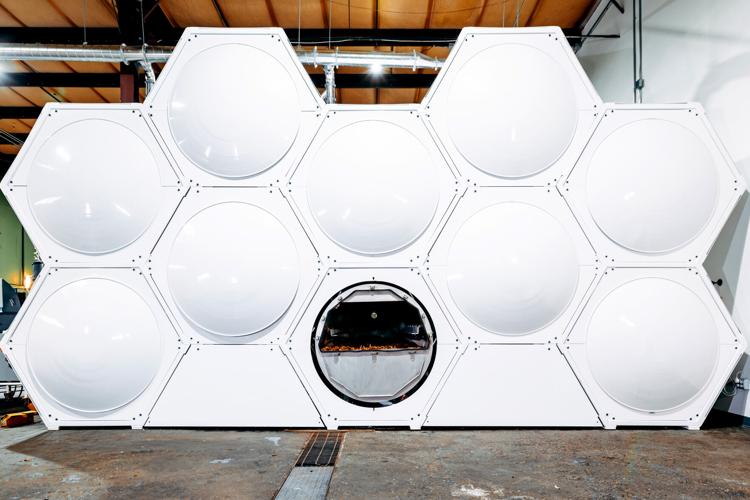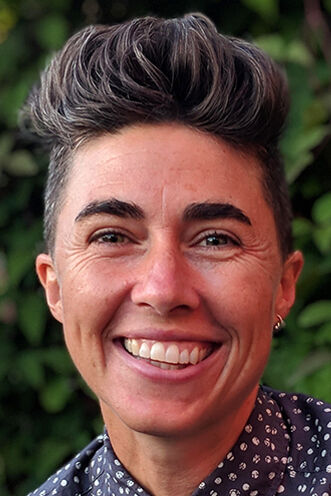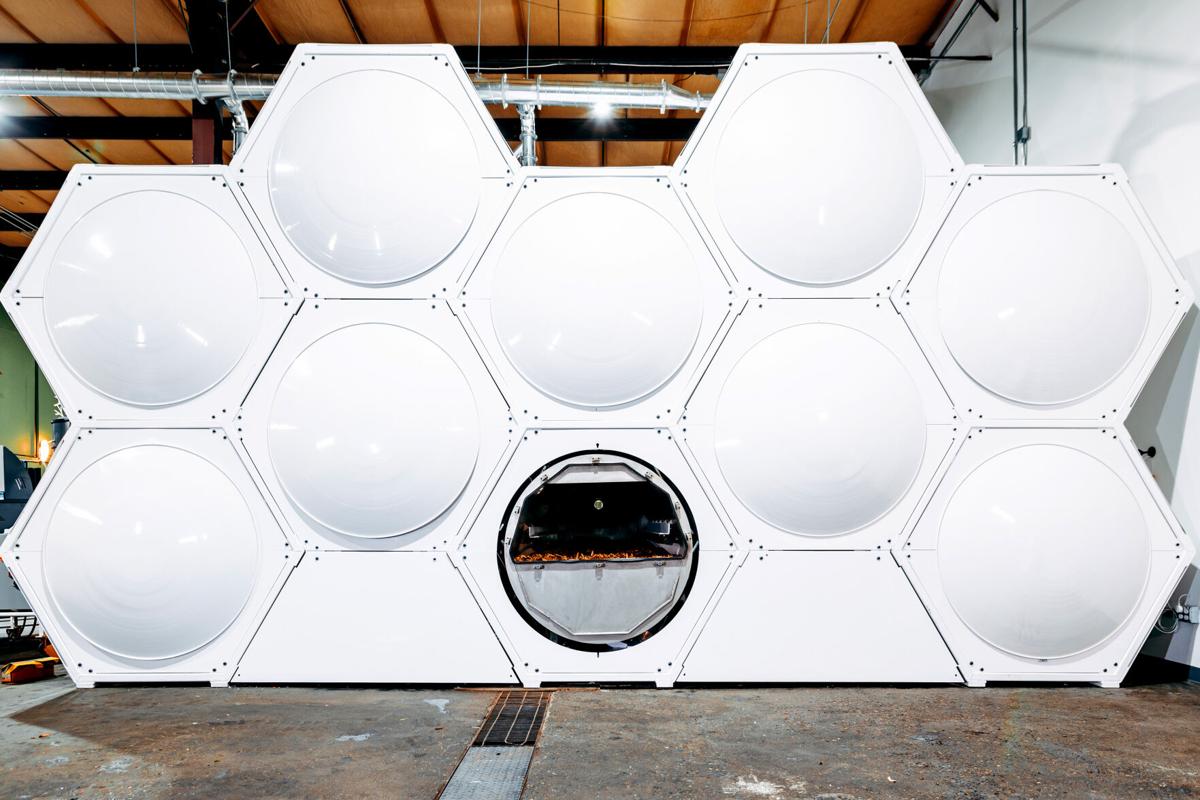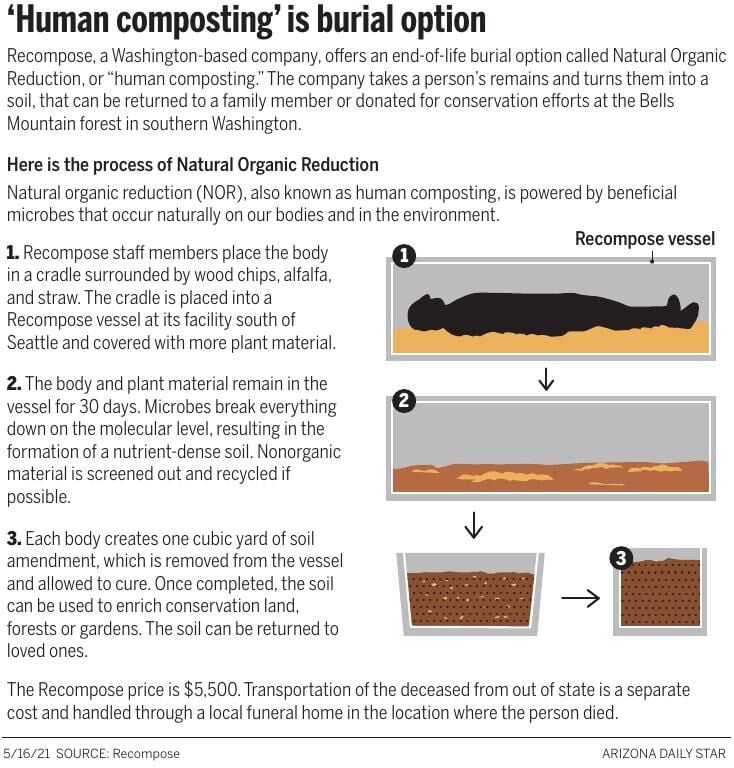A decade ago environmentalist Katrina Spade began thinking about what is now Recompose — a Kent, Washington, funeral home that transforms the dead into compost.
Spade is the founder and chief executive officer of the public benefit corporation, which began operations last year after Spade spent years developing a prototype of the metal vessel that would turn a corpse into human compost through natural organic reduction.
She also led for the legalization of the process and, in 2019, Gov. Jay Inslee signed the bill making natural organic reduction law. The law went into effect May 2020, making Washington the first state to legalize an option to burials and cremations.
Recompose has transformed 40 bodies into human compost, and most clients have chosen to donate their soil remains to be spread on private protected forest land on Bells Mountain near Vancouver, Washington, said Anna Swenson, a University of Arizona graduate who is the company’s outreach manager.
And 700 people are on Recompose’s $5,500 pre-payment plan to have their bodies turned into soil after their death and used to restore land on Bells Mountain, said Swenson. The soil — enough to fill a standard pickup truck bed — can also be returned to family members.
On May 20, Swenson will do a virtual presentation about Recompose and natural organic reduction hosted by Tucson’s Casa de la Luz Foundation as part of its end-of-life series. It is open to the public. (See attached information box.)

Katrina Spade, founder and CEO of Recompose.
The natural organic reduction, or human composting event “came out of the desire from community members to learn more about this type of an option,” said David Fife, foundation board member and chair of the education committee. “Learning about these alternatives opens up doors for discussions that may not be there otherwise. It allows us to be more comfortable talking about our mortality.”
The virtual series has attracted participants across the nation and abroad. “This has been great because it brings more diversity into the conversation,” said Julie Evans, executive director of the foundation.
This option to burial or cremation is not widely known, nor is it available in Arizona, but Recompose has the ability to take in deceased individuals from other states by working with funeral homes in the location where the person died.
How it began
In the summer of 2011, Spade was playing with her young son in their backyard and she realized she would be old some day, and she began thinking about her mortality and death care options.
She cared about the environment and contemplated a greener option rather than burial and cremation, according to the Recompose website.
As an architecture student studying for a master’s at the University of Massachusetts Amherst, Spade learned from a childhood friend that farmers have composted farm animals for decades and she wondered about human composting, states the Recompose website.
She built a compost heating system with friends and continued her research in 2013. After graduation a year later, she worked as an architect by day and at night on the human composting concept, receiving a two-year Echoing Green Fellowship that allowed her to work full-time with soil science, engineering and program management experts on her human compost project.
In 2015, Spade worked with Cheryl Johnston, a professor at Western Carolina University, to test the human composting concept with the Department of Forensic Anthropology and completed the process on a human body for the first time. The milestone was covered by media, including The New York Times.
Spade launched a funding campaign and raised $91,378 for further research and a human composting prototype.
In the fall of 2017, investors raised $693,000 and in the spring of 2018 Lynne Carpenter-Boggs of Washington State University worked with Spade to complete a study on natural organic reduction with six donor bodies. The study proved the process of eliminating pathogens and heavy metals to under EPA recommended-levels, states the website.
In Colorado, Gov. Jared Polis signed a bill May 10 making human composting legal, said Swenson, adding that Recompose also led legalization efforts in the state. The law will go into effect 90 days after the legislative session ends, making Colorado the second state allowing human composting as a post-death option, according to an article in The Denver Post.
Swenson said lawmakers in New York, California, Oregon and Delaware are working to pass legislation to legalize human composting in their states. “It is Recompose’s vision to make our process available to everyone who wants it,” said Swenson. “The Colorado legalization and the continued growth of our community and customer base keep us motivated to continue expanding our mission of ecological death care access for all,” she said.

Bells Mountain Forest in Washington is where composted human remains can be donated for conservation efforts through a Washington company called Recompose.
“It’s an honor to do this work,” said Swenson. “I feel lucky to be a part of a company that not only has a strong environmental mission, but also brings people peace and comfort.”
At presentations, said Swenson: “People are usually curious about our process and eager to learn. Even if Recompose isn’t right for them, they are often intrigued to learn about the environmental impacts of death care and the options available.”
Little information in Arizona
In the funerary industry as to Arizona officials, human composting is not well known. In Arizona, there are no state laws that restrict the scattering or storage of cremated remains.
But, Mary Clare Lynch, executive director of the Funeral Consumers Alliance of Arizona, urges “consumers to check county and city zoning laws before sprinkling remains.” Lynch had no information about human composting.
Natasha Culbertson, executive director of the Arizona Board of Funeral Directors and Embalmers, said she could not speak about human composted remains possibly sent to an Arizona resident “from another state or whether they could then use them in their garden” because that isn’t the board’s jurisdiction.
“We don’t regulate what a consumer chooses to do with a loved one’s remains; we regulate the professionals and establishments providing the consumer with services,” said Culbertson.
She said human composting “is a very interesting concept that is well worth the board looking into. We are always interested in keeping up with new developments in the industry in order to best protect and provide options for Arizona consumers.”
Heather Pace, executive director of the Arizona Funeral, Cemetery and Cremation Association, said human composting “is such a new area of disposition” that Pace had no information to share and she is “not aware of any legislation surrounding compost remains in Arizona currently, nor have I heard of any forthcoming legislation.”








